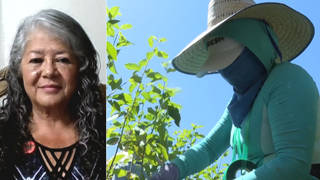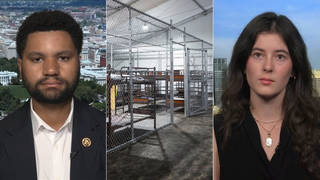
Topics
Guests
- Baher Azmylegal director for the Center for Constitutional Rights and part of the legal team for detained Columbia student protest leader Mahmoud Khalil.
President Trump has signed a new travel ban barring citizens of 12 countries from entering the United States. The ban applies to Afghanistan, Burma, Chad, Equatorial Guinea, Eritrea, Haiti, Iran, Libya, Somalia, Sudan, Yemen and the Republic of Congo. The Trump administration is calling some of the countries “terrorist safe havens” and citing high visa overstay rates for others. Compared to the first Trump administration’s sweeping travel bans, which targeted travelers from Muslim-majority countries, this latest iteration is more likely to withstand legal challenges, says Baher Azmy, legal director for the Center for Constitutional Rights, which challenged the previous bans. However, the new order will be just as “devastating,” says Azmy.
Transcript
NERMEEN SHAIKH: President Trump has signed a new travel ban barring citizens of 12 countries from entering the United States. A similar ban during Trump’s first administration sparked major protests at U.S. airports and numerous lawsuits.
The impacted countries are Afghanistan, Burma, Chad, Equatorial Guinea, Eritrea, Haiti, Iran, Libya, Somalia, Sudan, Yemen and the Republic of Congo, which is also known as Congo-Brazzaville, not to confused with the Democratic Republic of the Congo. New travel restrictions will also be placed on visitors from Burundi, Cuba, Laos, Sierra Leone, Togo, Turkmenistan and Venezuela.
Trump linked the new travel ban to the recent attack in Boulder, Colorado, when an Egyptian-born man used a makeshift flamethrower and incendiary devices to attack a crowd of people taking part in a weekly walk to honor Israeli hostages in Gaza. Trump, however, did not add Egypt to the list. On Wednesday night, the White House released a video of Trump speaking about the ban.
PRESIDENT DONALD TRUMP: Very simply, we cannot have open migration from any country where we cannot safely and reliably vet and screen those who seek to enter the United States. That is why today I am signing a new executive order placing travel restrictions on countries including Yemen, Somalia, Haiti, Libya and numerous others.
AMY GOODMAN: For more, we’re joined by Baher Azmy. He’s legal director for the Center for Constitutional Rights, which challenged the first Trump travel ban, along with other groups.
Welcome back to Democracy Now!, Baher. Explain the significance of what President Trump did last night.
BAHER AZMY: It’s significant on its own, but more so in a continuum with a series of, you know, sort of showcasing, almost day by day or week by week, some new immigration policy that effectuates their sort of evangelical, white supremacist fantasy about this country. So, there was, you know, the shipping people to Guantánamo, that former security theater, then CECOT, then coming after Palestinian students, then attacking — you know, descending ICE onto schools and courthouses, and now this, a new iteration of a Muslim travel ban that is going to be devastating to families, families from these countries who seek immigration visas or, in some cases, even tourist visas.
And regrettably, the lesson from the last time is that the Supreme Court seems amenable to these claims. The Supreme Court, and really almost only this Supreme Court, seems amenable to claims of the executive that he has enormous immigration-based authority to, quote, “secure the borders” or, quote, “determine what’s detrimental to the United States” by excluding people of color.
NERMEEN SHAIKH: And so, Baher, can you explain? You mentioned the Supreme Court. There was a 2018 decision which people say, legal experts have said, will make this travel ban harder to challenge than the 2017 one.
BAHER AZMY: Yeah, unfortunately, I think that’s right. So, people will remember the chaos from the first travel ban, that was very, very particularly tied to Muslim-majority countries, and the chaos it caused in the airports. And virtually all the lower courts determined, like, what was very obvious to any human being, which is this was discriminatory. It’s discriminatory on the basis of religion and national origin, namely excluding Muslims alone, and therefore should violate the Constitution.
John Roberts, as he is wont to do, pretends that what’s plain to every sentient human being is not actually the case, finds that it wasn’t really driven by racial or religious animus, and then invoked the massive authority that this Supreme Court has given the president, under provisions of the Immigration and Nationality Act, to exclude, quote, “aliens,” exclude noncitizens, even when it seems very patently on the basis of race or religion.
NERMEEN SHAIKH: And so, Baher, can you explain? This particular ban includes exemptions for visa holders and permanent residents. That’s unlike the first ban. Do you know why this exemption was put in?
BAHER AZMY: Yeah, this is a little bit less legally — a little bit less obviously unconstitutional than the first ban. It includes more countries that are not Muslim majority. It permits claims for asylum, exempts lawful permanent residents. And I think it’s just an effort to make it a little bit more tailored legally. They perhaps have learned their lesson that they can achieve the shock value and the, you know, inflicting trauma on parents and families by doing it in a more tailored way that the Supreme Court would ratify.












Media Options